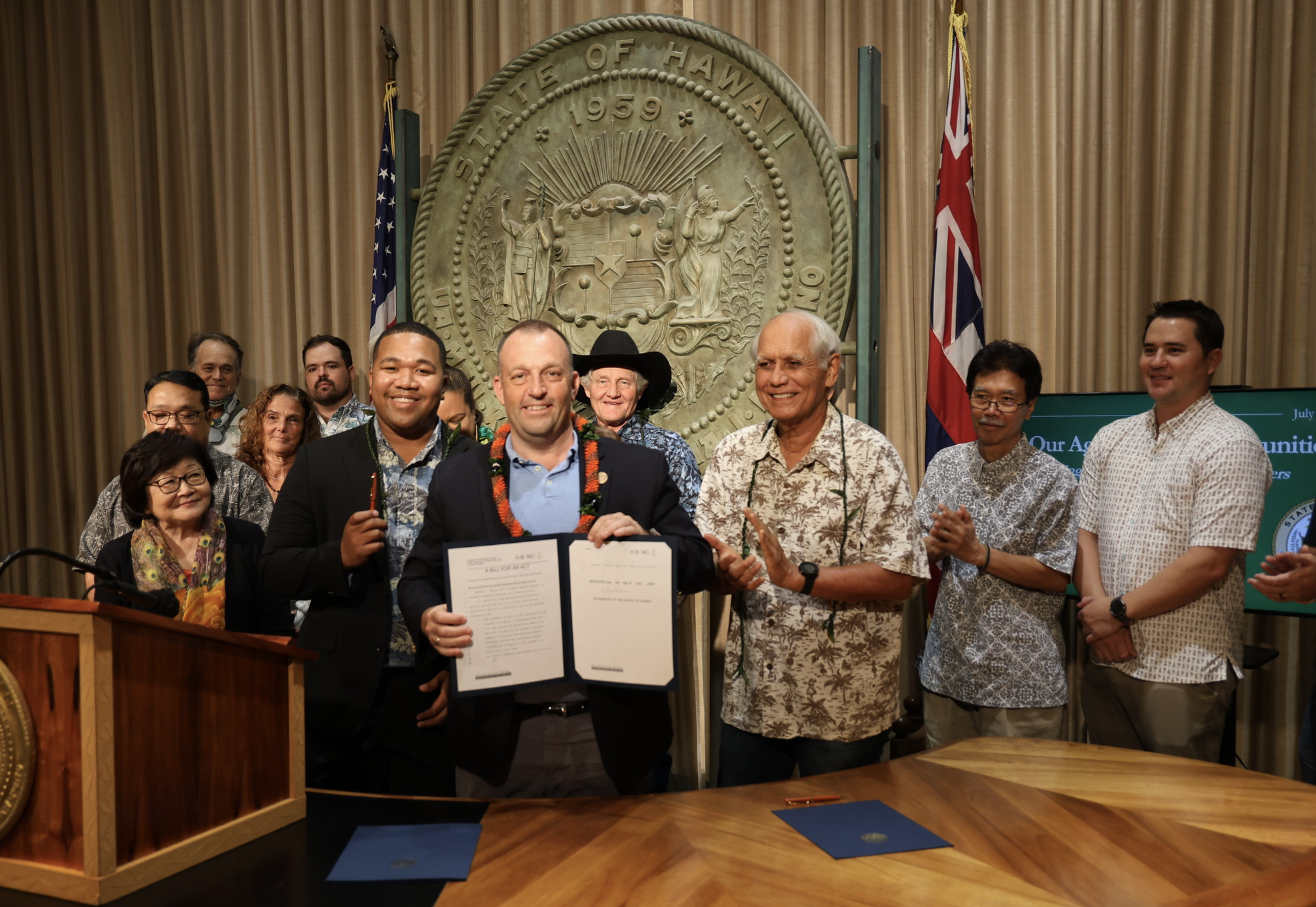Governor Josh Green, M.D., signed several bills into law to help combat climate change and work towards the state’s zero-emission goal of 100-percent clean energy by 2045.
“Today we are taking action to build a clean energy future by signing bills that will create more standards for efficiency, protect our environment, and create more opportunities for collaboration,” said Governor Green. “It’s important to identify our vulnerabilities and then develop strategies to reduce carbon emissions and other pollutants that adversely affect our environment.”
Three of the six bills signed during the ceremony included SB691 (Act 224) which authorizes the State Energy Officer to adopt rules to enforce or amend minimum efficiency standards for certain products. This will provide product suppliers to have ample time to bring more energy-efficient products to market, which will result in greater energy and water savings starting in 2025.
Another bill signed, HB192 (Act 225), prohibits the sale of certain fluorescent lamps to reduce energy waste and quantities of mercury from such lamps to avoid having them pollute Hawaiʻi’s environment. Ten other states have already adopted similar laws.
SB1024 (Act 226), which was also signed during the ceremony, establishes long-term goals and implements strategies that help to reduce and ultimately eliminate greenhouse gas emissions from Hawaiʻi’s ground and interisland transportation sectors. It also establishes a clean ground transportation working group and interisland transportation working group comprising Hawaiʻi state agency heads and other stakeholders.
“Transportation produces the majority of Hawaiʻi’s emissions,” said Senator Chris Lee, chair of the Senate Committee on Transportation and Culture and the Arts (District 25 Kailua, Waimānalo, Hawai‘i Kai) and author of SB1024. “This bill will move Hawaiʻi toward zero emissions from land, sea, and air transportation, catalyzing investment in new local jobs, reducing future transportation costs, and building a cleaner Hawaiʻi economy for our next generation.”
“These bills will provide direct savings to Hawaiʻi’s families and businesses by lowering energy costs, will benefit the electric grid by reducing demand, will reduce toxic waste in the environment, and will avoid hundreds of thousands of tons of carbon emissions,” said Nicole Lowen, chair of the House Committee on Energy and Environmental Protection (District 7, Kailua-Kona, Honokōhau, Kalaoa, Puʻu Anahulu, Puakō, portion of Waikoloa). “Measures like these are the true steps forward where we put one foot in front of the other and start making real change in the real world,” she said.
“Hawaiʻi is recognized as a global leader on ambitious climate policy, and the bills signed into law today move us closer to making our climate goals a reality,” said Blue Planet Foundation Executive Director Melissa Miyashiro. “We can’t overlook the importance of affordability as we transition to cleaner energy sources. The energy efficiency bills enacted today will play a foundational role in helping Hawaii lower its carbon footprint, while also lowering utility bills for residents and businesses. These are the win-win climate policies we need.”
Additional bills signed into law today include:
SB1417 SD1 HD1 CD1, (Act 221) Relating to Climate Change
Kakaʻako climate change and sea level rise
Requires the Hawaiʻi Community Development Authority to consider the impacts of climate change, sea level rise, and climate-resilient development in the design and siting of buildings in the Kakaʻako and Kalaeloa community development districts. (CD1)
SB1534 SD2 HD3 CD1, (Act 222) Relating to Transportation
Electric vehicle road usage charge
Creates a mileage-based road usage charge to replace state motor fuel taxes beginning on July 1, 2025, for electric vehicles. Eliminates the $50 annual state vehicle registration surcharge for electric vehicles. Allows electric vehicle owners to pay a registration surcharge or a per-mile road usage fee until June 30, 2028. Requires certificates of inspection to state the odometer reading of vehicles. Requires motor vehicle registration applications to specify whether the type of fuel for which the vehicle is adapted is battery electricity. Requires the Department of Transportation to plan for the deployment of a state mileage-based road user charge program by 2033 and submit a report to the Legislature. Appropriates funds. (CD1)
SB1173 SD1 HD2, (Act 223) Relating to Vehicles
Vehicle emissions penalties
Prohibits a person from causing a diesel- or gas-powered vehicle to discharge clearly visible smoke, soot, or other exhaust emissions onto another person or motor vehicle. Establishes a minimum $500 fine for violators. (HD2)


